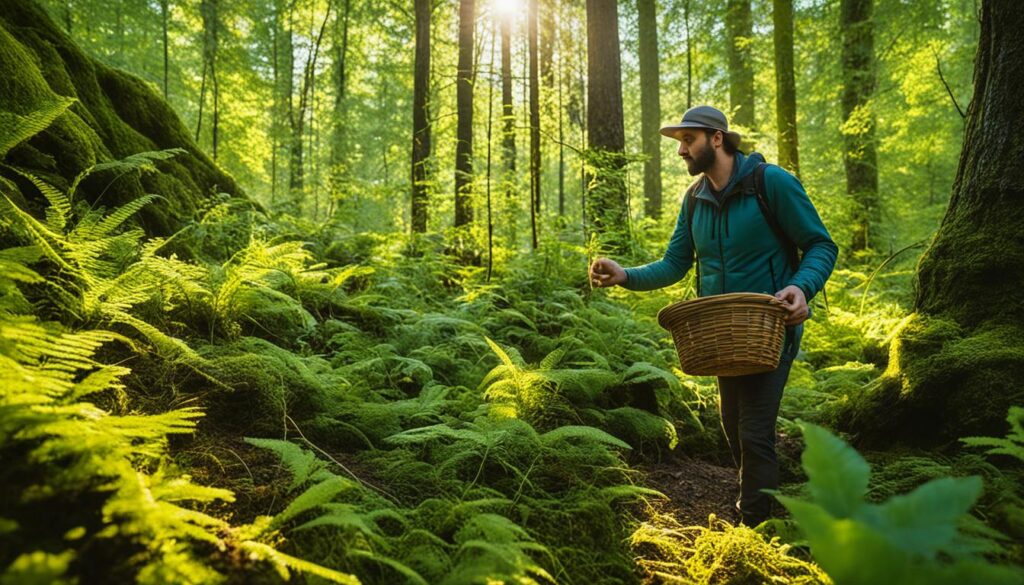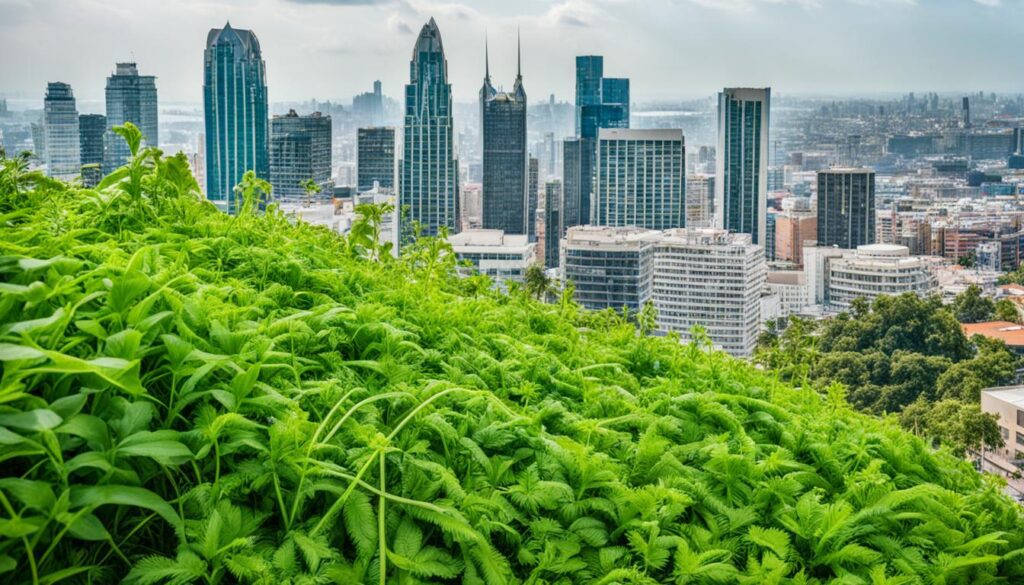Welcome to Bengaluru, a city alive with a special culture. It’s all about using wild edible plants, or “weed” or “soppu,” in a smart way. This guide will show you the history, health perks, and cooking ways of these plants. They’ve been a big part of Bengaluru’s food for a long time.
In a world that’s often far from nature, Bengaluru’s folks keep a strong bond with their city’s wild side. They find food and peace in the wild plants that grow everywhere. These plants are a tasty and green choice, letting you start a green journey and feel closer to nature.
Key Takeaways
- Explore the vibrant urban foraging culture in Bengaluru, India.
- Discover the rich history and nutritional benefits of wild edible plants, locally known as “weed” or “soppu”.
- Learn about the culinary traditions and responsible ways to engage with Bengaluru’s green scene.
- Uncover the importance of maintaining a connection with nature through foraging in the city.
- Find reliable sources for cannabis delivery, marijuana shops, and legal weed in Bengaluru.
Introduction to Urban Foraging in Bengaluru
In Bengaluru, a secret activity has been alive for years – foraging. It’s about picking edible wild plants in public places. Many Bengaluru foragers, especially older women from low-income families, know a lot about these plants.
The Practice of Gathering Edible Wild Plants
People all over the world forage for plants in cities, and Bengaluru is part of it. These wild greens used to be found only in public spaces. Now, they’re sold in markets and used in dishes like bas saaru and massoppu.
But, urban foraging is getting less common. The city is changing fast, making it harder to find these edible wild plants. Still, the women of Bengaluru keep foraging. They do it to eat better and keep their traditions alive.
“Foraging is a way of life for us, passed down through generations. It’s not just about the food, but the connection to the land and our roots.”
– Shanti, a Bengaluru-based urban forager
The Art of Foraging for Wild Edible Plants
Foraging is an old way of finding food in the wild. In India, it’s a big part of our food culture. There are 1,403 types of wild plants that people eat, from 184 families.
In Bengaluru, foragers know which plants are good for eating, medicine, or culture. They know when to find them too. This knowledge comes from their ancestors and the city’s rich nature.
Shruti Tharayil leads wild food walks and workshops. She says many think wild greens are bad, but they’re not. They’re important for our health and the planet. Anandi Zhang Zhang also teaches about nature and food security in Auroville.
The urban foraging in Bengaluru is growing. More people are learning to find and eat wild plants. The lockdown made more people cook with greens from their gardens.
| Foraging Highlights in Bengaluru | Key Findings |
|---|---|
| Nina Sengupta’s Research | Created a coloring book on edible weeds in India. Her research talks about how safe and nutritious these plants are. |
| Savita Uday and Forgotten Greens | They focus on foraging in seasons. For example, they find tubers in winter and wild fruits in summer. |
| Suresh Kumar G of Sarjapur Curries | He brings back local greens and weeds. He uses them in dishes like bassaru during the monsoon. |
Foraging takes patience and skill. You must know which plants are safe to eat. The best time to forage is from October to January. In Bengaluru, people find fruits and weeds in empty lots and by the roadside.
More people are getting into foraging for wild edible plants Bengaluru on social media. Accounts like @thesaagarchive share recipes and tips on Bengaluru wild plant knowledge. As urban foraging practices Bengaluru grow, we must focus on being aware and protecting these plants for the future.

“Foraging requires patience, time, and observational skills. It’s crucial to identify edible plants accurately to avoid potential disasters.”
Chasing Soppu: A Guide to Wild Edible Plants of Bengaluru
Identification, Recipes, and Remedies
In Bengaluru, a city full of life, wild edible plants are waiting to be found. “Chasing Soppu” is a guide by Harini Nagendra, Ranjini Murali, and Rohit Rao. It shows how to find over 50 plants that grow in the city.
This guide sorts plants into climbers, spreaders, and upright ones. It gives clear ways to tell them apart and shares recipes from local women. These plants are hidden in many places, like unused land and parks, near Bengaluru’s lakes.
Puttamma, a 60-year-old forager, found 18 edible plants on a tour. The book talks about how these plants are used in cooking, medicine, and rituals. They help with health, cooking, and even keeping evil spirits away.
But, some plants can be harmful, so it’s key to know which is which. The book says making cities greener could help people and the planet. It could cut down on farming and transport harm.
“Chasing Soppu” is great for anyone interested in foraging in Bengaluru. It’s a way to connect with nature and enjoy the city’s secret tastes.

“Locally sourced wild plants can provide essential nutrients, contribute to battling malnutrition, and reduce carbon footprints associated with agriculture and transportation.”
- The book lists over 50 wild edible plants in Bengaluru, sorted by type.
- Some plants are sold at markets like Banashankari and Mavalli.
- Street vendors near Halasuru Metro Station and Lalbagh also sell these plants.
- These plants are used for food, medicine, and in cultural practices.
- Plants like Malabar Spinach and aloevera are common in city neighborhoods.
| Plant Name | Culinary Uses | Medicinal Benefits |
|---|---|---|
| Hongone soppu (Joy weed) | Used to make saaru or sambhar, considered nutritious and good for the eyes | Scientists in Taiwan are exploring its hepato-protective properties |
| Hulichikki (Clover) | – | Used in the treatment of influenza, fever, urinary tract infections, diarrhea, sprains, and even poisonous snake bites |
| Kanne Soppu/Gubbaacchhi baale (Commelina communis) | – | Has cooling properties and offers relief from headaches, heat boils, and constipation |
weed in Bengaluru: A Sustainable Food Source
Bengaluru is growing fast, but it still has many foragers. They look for wild edible plants, or “weed,” in the city. These plants can be a good food source. They help the poor, fight hunger, make more food available, and add variety to farming.
It’s important to value these wild plants for their nutrition and culture. The knowledge of foraging is fading as people’s lives change and fewer door-to-door vegetable sellers are around. Sharing this knowledge and recording the wild plants can make wild greens more popular.
Artist Suresh Kumar G has brought back over 15 edible weeds in a small garden in Bengaluru. He also helped villages grow more than 15 edible weeds and 6+ types of wild veggies naturally. Suresh saved at least 25+ edible weeds in a seed bank, showing Bengaluru’s weed wealth.
“Rs 5 lakh was awarded to Suresh during the ‘Urban Biodiversity Retreat’ for his project, which led to the birth of ‘Sarjapur Curries’ in June 2019.”
Suresh’s garden was made with money from a grant. It uses soil from dry lake beds and old terracotta tiles. This shows how weed can be a sustainable food source in Bengaluru. Using these wild plants can fight hunger and keep traditional knowledge alive. It also helps local plants.
Reconnecting with Nature Through Foraging
In Bengaluru, ecologist Nina Sengupta says foraging can help us feel close to nature again. She started foraging when she saw lal makoi plants in Kolkata. She realized many people had lost touch with nature and the plants around them.
Sengupta thinks foraging can make us feel more connected to nature and protect the environment. She runs adult coloring books and foraging walks to share her knowledge. She wants people to find the hidden nature in their daily lives.
“Foraging can be a way to feel more anchored in nature and protective of the environment, even in urban settings.”
The Importance of Wilderness in Daily Life
Sengupta’s ideas match the growing worry about our lack of nature connection. Phra Paisal Visalo, a Buddhist monk, says our focus on buying things has made us lose touch with nature. This is called “nature deficit disorder.”
By foraging, people can eat wild plants and feel closer to nature in Bengaluru. This can make us happier and help us live more sustainably.
Sengupta’s work shows how foraging in Bengaluru can change lives. It helps people connect with nature and appreciate the nature around us, even in cities.
Conclusion
The journey into weed in Bengaluru shows a deep culture of urban foraging. It also highlights the use of wild edible plants, or “soppu,” in local cooking. This guide aims to inspire you to connect with nature and use Bengaluru’s green spaces wisely.
It teaches you how to use green spaces in Bengaluru safely. It also shows the importance of keeping traditional foraging knowledge alive. As India looks into the future of cannabis, it seems laws might change to fit new uses of this plant.
By following the sustainable foraging and cooking ideas here, you can help make Bengaluru a greener, healthier place. This guide is not just about the plants. It’s about loving and understanding the world around us, even in the city.

As a veteran weed smoker for over 30 years and been very clean for the last 3 years, I have been craving it.
One thing I’ve never done is consume it?
I came across SunJet Plug and thought mmmm how esp with legalities etc.
So I made the plunge and purchased 12 brownies, well within 30 mins it kicked in and it was immense as I had a whole one from the off 😜
The rest did not last a week I was having 2 a day and my wife lost me for a few days I was in my own world apparently.
Kudos to the Sunjet plug love em, the taste is a bit undesirable could do with a tweak or two other than that no complaints
Contact him on his telegram link: t.me/sunjetplug
His email : sunjetplug@gmail.com
Many many thanks.😁
Take note ,he does not have telegram channels
Sunjet plug is 100% legit.. I’m a repeat customer.. I’ve ordered 10+ times now, and I’ve never had an issue.. Great product, great service.
Sunjet plug is extremely trust worthy , they never fail in what ever product I order, and its always in my hands with an hour of ordering 99% of the time….. its honestly rare when its more than 2 hours and that’s only because its the weekend when ive orded or a national holiday is on or something lol …. brilliant service I’m probably pushing maybe 2 months with them and I’ve never been disappointed ❤️ my only recommendation would maybe do a stamp card to get something free after 5 orders or a loyalty bonus of some kind ❤️
Email sunjet.. sunjetplug@gmail.com